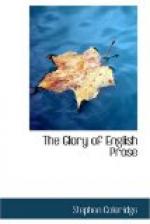But I feel that the writer who was perhaps the greatest essayist that England has ever produced must not in these letters be fobbed off with so slight a notice and quotation.
What has always seemed to me the supremest passage that flowed from his wonderful pen is to be found in his paper on Warren Hastings which appeared originally in the Edinburgh Review.
His description in that essay of the opening of the great impeachment, has given all succeeding generations a vision of one of the most majestic scenes in the whole history of man.
“There have been spectacles more dazzling to the eye, more gorgeous with jewellery and cloth of gold, more attractive to grown-up children, than that which was then exhibited at Westminster; but, perhaps, there never was a spectacle so well calculated to strike a highly cultivated, a reflecting, an imaginative mind. All the various kinds of interest which belong to the near and to the distant, to the present and to the past, were collected on one spot and in one hour. All the talents and all the accomplishments which are developed by liberty and civilisation were now displayed, with every advantage that could be derived both from co-operation and from contrast. Every step in the proceedings carried the mind either backward, through many troubled centuries, to the days when the foundations of our constitution were laid; or far away, over boundless seas and deserts, to dusky nations living under strange stars, worshipping strange gods, and writing strange characters from right to left. The High Court of Parliament was to sit, according to forms handed down from the days of the Plantagenets, on an Englishman accused of exercising tyranny over the lord of the holy city of Benares, and over the ladies of the princely house of Oude.
“The place was worthy of such a trial. It was the great hall of William Rufus, the hall which had resounded with acclamations at the inauguration of thirty kings, the hall which had witnessed the just sentence of Bacon and the just absolution of Somers, the hall where the eloquence of Strafford had for a moment awed and melted a victorious party inflamed with just resentment, the hall where Charles had confronted the High Court of Justice with the placid courage which has half redeemed his fame. Neither military nor civil pomp was wanting. The avenues were lined with grenadiers. The streets were kept clear by cavalry. The peers, robed in gold and ermine, were marshalled by the heralds under Garter King-at-Arms. The judges in their vestments of state attended to give advice on points of law. Near a hundred and seventy lords, three-fourths of the Upper House as the Upper House then was, walked in solemn order from their usual place of assembling to the tribunal. The junior Baron present led the way, George Eliot, Lord Heathfield, recently ennobled for his memorable defence of Gibraltar against the fleets and armies of France and Spain.




